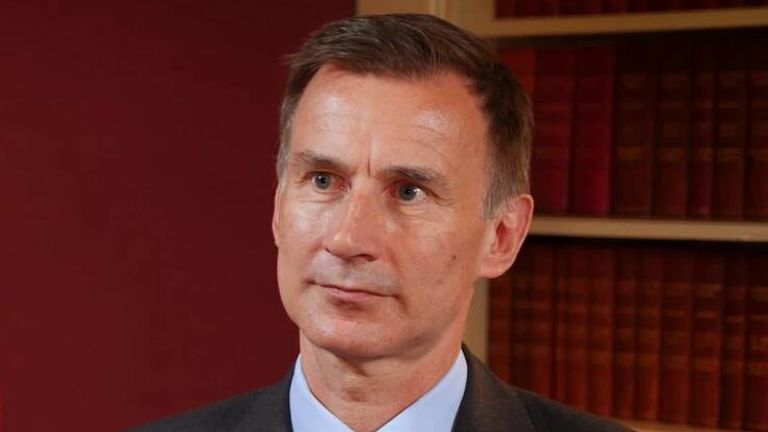Chancellor comfortable with recession if it brings down inflation
Jeremy Hunt says he feels an obligation to support the Bank of England in its decisions, as a way of ensuring prosperity and economic growth.

Jeremy Hunt has told Sky News he is comfortable with Britain being plunged into recession if that's what it takes to bring down inflation.
The chancellor said that he would fully support the Bank of England raising interest rates higher, potentially towards 5.5%, as it battled higher-than-expected prices.
Asked by Sky News whether he was "comfortable with the Bank of England doing whatever it takes to bring down inflation, even if that potentially would precipitate a recession", he said: "Yes, because in the end, inflation is a source of instability.
"And if we want to have prosperity, to grow the economy, to reduce the risk of recession, we have to support the Bank of England in the difficult decisions that they take.
"I have to do something else, which is to make sure the decisions that I take as chancellor, very difficult decisions, to balance the books so that the markets, the world can see that Britain is a country that pays its way - all these things mean that monetary policy at the Bank of England (and) fiscal policy by the chancellor are aligned."
The comments came after market expectations for the eventual peak of UK interest rates leapt dramatically, following higher-than-expected CPI inflation data this week.
While the anticipated peak for UK rates was a little above 4.75% last week, it lurched higher, to 5.5%, following Wednesday's statistics. Save for the gyrations after the mini-budget last autumn, it was the biggest shift in interest rate expectations since 2008.
Prime Minister Rishi Sunak pledged in January that he would halve inflation this year, which in practice means bringing it down to just above 5% by the end of 2023. The Bank of England's forecasts earlier this week suggested he would narrowly succeed.
However, since the latest inflation data is significantly higher than the Bank's forecast trajectory, the pledge may be missed.
But the prime minister also pledged to grow the economy.
And while the International Monetary Fund said this week that the UK would avoid recession, economists believe it's now plausible, given those higher interest rate expectations, that Britain instead sees gross domestic product (GDP) contract for two quarters - the technical definition of a recession.
Mr Hunt added: "When the prime minister announced that it was his objective to halve inflation in January, there were some people who derided that, they said: 'well it's automatic, inflation is going to come down anyhow'.
"There's nothing automatic about bringing down inflation, it is a big task, but we must deliver it and we will.
"It is not a trade-off between tackling inflation and recession. In the end, the only path to sustainable growth is to bring down inflation."
Nick-Thomas Symonds, Labour's shadow international trade secretary, told Sky News that no government "should ever be content to see a recession".
He said the economic situation was "the consequences of all the failed and wasted years of Conservative government".
Norman Lamont, who was a Treasury minister under Margaret Thatcher and chancellor under John Major, told Sky News that Mr Hunt should be "applauded, not criticised", for taking a view "that is in the national interest in the long term".
He added: "I don't think he was saying he expected or wanted a recession, but he was just saying the top priority has to be getting inflation down."
-sky news







